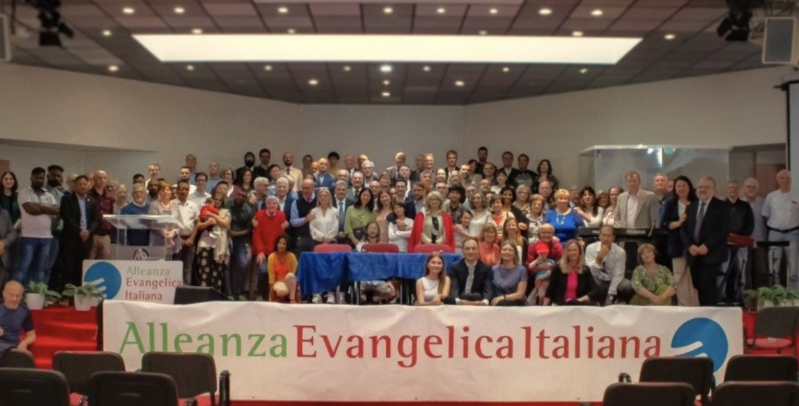
On May 10–11, 2024 in Rome, Italy, the Italian Evangelical Alliance (Alleanza Evangelica Italiana, AEI) celebrated its 50th anniversary during its 2024 general assembly. The event also commemorated 50 years since the first World Congress on Evangelization held in Lausanne, Switzerland and included members of the Lausanne Movement.
Pastor Scognamiglio, a member of the first AEI committee in 1974, told the assembled group that he was happy to see how the alliance has “borne fruit over time.” Letters from former AEI presidents were shared. According to Evangelical Focus, Italian Foreign Minister Antonio Tajani also wrote an “extensive letter on the government’s commitment to religious freedom” which was read to assembly participants.
AEI leadership and members attending the event remarked on “God’s faithfulness” as their organization grew and overcame challenges. From Pentecostals and the Salvation Army to Chinese and Romanian churches, many evangelical groups expressed their gratitude for the AEI.
The general assembly also had several panels that discussed topics such as the state of mission in Europe, the regional impact of Lausanne, and the state of religious freedom on the continent.
In one panel, Co-director of the Lausanne Movement Europe Jim Memory talked about Europe’s current spiritual condition. “The narrative of Christians about Europe should not be dominated by pessimism but by what can be read in the Bible’s book of Revelation 7, where people of every language and nation are around the throne,” Memory stated.
AEI’s vice president Lucia Stelluti explained that priority must be placed on being faithful to the gospel. “Without fidelity to the Word of God there is no evangelical mission, but inconclusive religious activism.”
Jonathan Gilmore, the Acts 29 area lead for southeastern Europe, explained that the Lausanne Movement can be a platform that strengthens conversation among evangelicals in Italy. He also said it can magnify the impact of missional vocations.
Another panel discussed religious freedom. Julia Doxat-Purser, socio-political representative of the European Evangelical Alliance, explained that problems exist on three main levels. The first is defective or discriminatory laws (legislative level). The next is the absence of a value for pluralism (cultural level). And the final is a problem that Doxat referred to as secularization that becomes an anti-religious mindset (antagonistic level).
She emphasized that the goal is not to protect “Christendom,” but to ensure religious freedom for all. Co-chair of the Lausanne Movement Europe (LME) Usha Reifsnider mentioned how migration is reshaping churches in Europe. Referring to Leviticus 19:33-34, she pointed out the Christian duty to welcome foreigners as native-born regardless of a person’s religious background. Reifsnider went on to share that conversions to Christ can come about when the Church fulfills these responsibilities.
Following the panel discussions, the Theology and Dialogue Commission of the AEI initiated a dialogue on collaborating for theological formation, research, and evangelical witness. It was agreed to establish a forum which includes several theological training institutions and a representative of the AEI. Participation in the forum is open to other evangelical teaching institutions.
In the last part of the assembly, the AEI presented a document asking four questions about evangelical witness, today. It connected to the 850th anniversary of the Waldensian movement – a pre-reformation ascetic movement in France and Italy which was later absorbed into the Protestant movement. The questions were about the authority of Scripture, the legitimacy of the Waldensian 1655 Confession of Faith, the place of ecumenicalism, and the significance of current evangelism efforts in Italy.
The Lausanne Movement is a globally recognized movement that gathers evangelical leaders together to collaborate and work together on pressing missional issues. The movement was born in 1974 with the International Congress on Evangelization in Lausanne, Switzerland. This first congress, headed by Billy Graham, attracted more than 2,300 leaders from 150 countries.
The AEI is an organization of communion and connection of evangelical churches, works and believers. It was founded in Florence in 1974 as a response to the European Congress on Evangelization (Amsterdam 1971) and the Lausanne gathering in 1974. It is now based in Rome.





